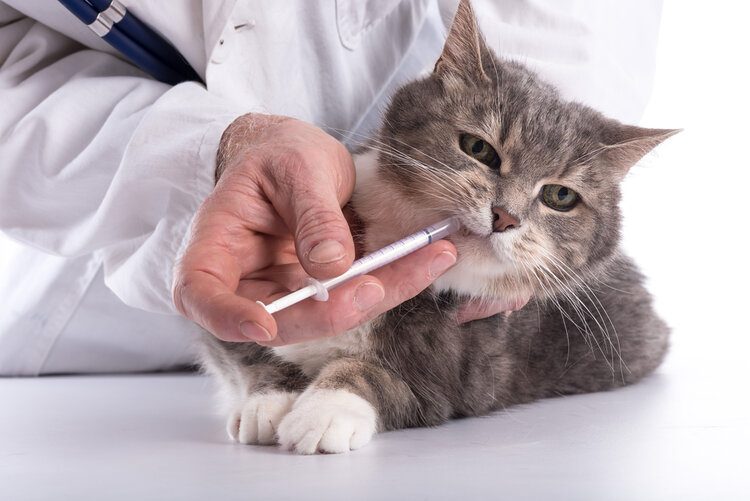Pyrantel pamoate is an anthelmintic (dewormer) medication commonly used in cats, dogs, small animals, and birds. Its use is “off-label” in cats but many veterinarians safely prescribe it as an effective treatment. Pyrantel can be used alone or in combination with other anti-parasite medications for the treatment of heartworm and intestinal parasites.


What is Pyrantel?
Pyrantel pamoate is a popular anthelmintic deworming drug. It is commonly used in cats to fight hookworms, intestinal roundworms, and stomach worms. Pyrantel is also used in other species such as rabbits and birds “off label.”
Pyrantel acts as a depolarizing neuromuscular blocking agent. It works by causing a sudden contraction followed by paralysis of the worms. This means they cannot attach to the cat’s intestinal lining, so they are removed from the body as the intestinal contents are moved down the gastrointestinal tract. Pyrantel is not well absorbed by the cat’s intestines, so the cat is not affected by the drug. Worms are usually passed out with feces.
Vomiting and diarrhea are occasionally seen. Your cat can stretch their stomach and strain when passing larger loads of worms due to the space it takes up. Pyrantel in cats is used for the treatment and prevention of hookworms and roundworms. It cannot be used to treat tapeworms or whipworms.
Pyrantel pamoate should be stored away from direct sunlight, in a closed container. It should be kept at room temperature—about 15°C–30°C or 59°F–86°F. It should always be out of reach of children and pets in an appropriate child and pet-proof container.
How is Pyrantel for Cats Administered?
Pyrantel pamoate comes in different forms so you can decide which is best for your cat. You can use capsules, tablets, chewable tablets, and a liquid suspension. The usual dose for Pyrantel pamoate is 2.5 to 5 mg per pound (that’s 5 to 10 mg per kilogram) as a single dose, then repeated doses over 2 to 4 weeks. Make sure you give the product for the correct length of time as recommended by your veterinarian.
Pyrantel pamoate is dosed by the oral route. It can be given with or without food. If your cat vomits after receiving the medicine on an empty stomach, it may be suggested that you give it food afterwards. If your cat is vomiting, consult your veterinarian for advice.
If you are using the liquid form, make sure you shake it well before giving it to your cat. Extra care should be taken when measuring liquid quantities. Always make sure you consult your veterinarian before administering any products containing pyrantel pamoate and always follow the dosing instructions provided by your veterinarian.



What Happens If You Miss a Dose?
It’s not the end of the world if you miss a dose of Pyrantel. You can give the dose when you remember or as soon as you can. This is acceptable unless the next dose is due, then you should only dose once and miss a dose. Once you have administered the later dose, you should wait the appropriate period as recommended by your veterinarian before re-dosing. Do not give two doses at once or give more than recommended by your veterinarian.
Pyrantel is generally very well tolerated by cats, but if there are signs of toxicity, or you think you have overdosed, you may notice signs such as:
- Breathing difficulties
- Dizziness
- Hypersalivation
- Vomiting
- Diarrhea
- Disorientation
- weakness
- collapse
If you see any of these signs, contact your veterinarian immediately. You can also contact the Pet Poison Helpline or Animal Poison Control Center.
- Pet Poison Helpline (855) 764-7661
- ASPCA Animal Poison Control (888) 426-4435


Potential Side Effects of Pyrantel
Pyrantel pamoate has very few side effects as long as the dosage of the drug is correct. However, as with all drugs, there are always some clinical signs that are seen in some cases. This may include:
- Vomiting
- Diarrhea
- Nausea
- No appetite
Other side effects that are not directly related to the drug but occur because of the drug’s action can also include intestinal obstruction. This happens if there is a heavy worm load. Obstruction usually occurs due to the effect of worms. This is more commonly seen when a smaller cat with a large parasite burden is being treated. This is because pyrantel is a spastic paralyzing agent. This causes all the worms to release their latches in the lining of the intestinal wall and expelled together. This can cause vomiting, diarrhea, and extreme fatigue.
It usually takes 24 hours for the drug to take effect, so these symptoms should stop. If not, consult your veterinarian for advice. Caution should be exercised when using pyrantel in elderly or very debilitated patients, or any cats with underlying health conditions.
Pyrantel is safe to use in nursing cats. Consult your veterinarian to discuss specific safety guidelines for using pyrantel in pregnant queens as there are different dosing instructions that need to be followed.
In very rare cases, pyrantel can be toxic if used for a long time. If you are concerned that your cat may be experiencing an adverse reaction to the product, consult your veterinarian immediately.

Frequently Asked Questions
Which worms does pyrantel pamoate treat in cats?

Pyrantel pamoate is mainly used for the treatment of a group of worms called ascarids. These include roundworms such as Toxicara cati and hookworms, such as Ancylostoma tubaeforme, Ancylostoma braziliense.
Which worms are not covered when using Pyrantel?
Pyrantel is very effective in the treatment of roundworms, however, it has a limited spectrum for the treatment of other parasites. If you are using pyrantel, you will need to add something else to cover giardia, toxoplasma, whipworm, tapeworm, and coccidia. Your vet can advise you on different treatments that can be used in combination.
Why do I see worms in my cat’s stool after using Pyrantel?
If you see worms in your cat’s stool after you give pyrantel, this is because the medicine is working and the worms attached to the lining of your cat’s intestines are now being expelled from the body. This is a normal response to treatment if intestinal worms are present in your cat.

Conclusion
Pyrantel is a popular anthelmintic treatment prescribed off-label for use in cats. It is used for the treatment of intestinal roundworms and hookworms. It does not cover many other parasites. Pyrantel is well tolerated in cats and adverse effects are rare unless an overdose is given. If your cat has a very large worm burden, they may suffer from intestinal obstruction if they are trying to pass too many worms at once.
Your vet can advise you on dosages and frequency of use depending on your cat’s weight and age. Pyrantel should not be used without veterinary instruction.
Featured Image Credit: David Herraez Calzada, Shutterstock


